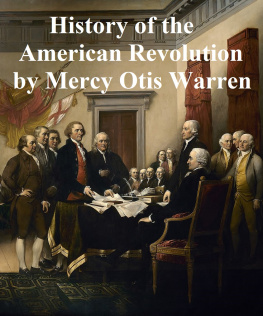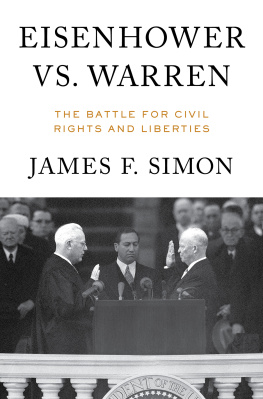HISTORY OF THE RISE, PROGRESS AND TERMINATION OF THE AMERICAN REVOLUTION BY MRS. MERCY WARREN OF PLYMOUTH MASSACHUSETTS
Interspersed with biographical, political and moral observations, in three volumes
(all three volumes in this one file)
1805
published by Samizdat Express, Orange, CT, USA
established in 1974, offering over 14,000 books
Our US history classics -
Life of Washington by Marshall
Winning of the West by Roosevelt
History of the American Revolution by Mercy Warren
The Writings of Abraham Lincoln
Papers of the Presidents 1789-1900
Complete Slave Narratives
Francis Parkman: 8 History Classics
Frederick JacksonTurner: 3 History Classics
Alfred Thayer Mahan: 11 History Classics
feedback welcome:
visit us at samizdat.com
-- from the origins to Valley Forge in 1778
-- An Address to the Inhabitants of the United States of America
Chapter 2 -- The Stamp Act. A Congress convened at New York, 1765. The Stamp Act repealed. New grievances. Suspension of the legislature of New York.
Chapter 3 -- Cursory Observations. Massachusetts Circular Letter. A new House of Representatives called. Governor Bernard impeached. A riot on the seizure of a vessel. Troops arrive. A Combination against all commerce with Great Britain. A General Assembly convened at Boston, removed to Cambridge. Governor Bernard after his impeachment repairs to England.
-- Character of Mr. Hutchinson. Appointed Governor of Massachusetts. The attempted Assassination of Mr. Otiose. Transactions of the March 5, 1770. Arrival of the East India Company's Tea Ships. Establishment of Committees of Correspondence. The Right of Parliamentary Taxation without Representation urged by Mr. Hutchinson. Articles of Impeachment resolved on in the House of Representatives against Governor Hutchinson and Lieutenant Governor Oliver. Chief Justice of the Province impeached. Chief Justice of the Province impeached. Boston Port Bill. Governor Hutchinson leaves the Province.
-- General Gage appointed Governor of Massachusetts. General Assembly meets at Salem. A proposal for a Congress from all the Colonies to be convened at Philadelphia. Mandamus Counselors obliged to resign. Resolutions of the General Congress. Occasional Observations. The Massachusetts attentive to the military discipline of their youth. Suffolk Resolves. A Provincial Congress chosen in the Massachusetts. Governor Gage summons a new House of Representatives.
-- Parliamentary divisions on American affairs. Cursory observations and events. Measures for raising an army of observation by the four New England governments of New Hampshire, Massachusetts, Rhode Island, and Connecticut. Battle of Lexington. Sketches of the conduct and characters of the governors of the southern provinces. Ticonderoga taken. Arrival of reinforcements from England. Proscription and characters of Samuel Adams and John Hancock. Battle of Bunker Hill. Death and character of General Joseph Warren. Massachusetts adopts a stable form of government.
-- Continental Army. Mr. Washington appointed to the command. General Gage recalled, succeeded by Sir William Howe. Depredations on the sea coast. Falmouth burnt. Canadian affairs. Death and character of General Montgomery.
Chapter 8 -- Dissensions in the British Parliament. Petition of Governor Penn rejected. Boston evacuated. Sir Henry Clinton sent to the southward., followed by General Lee. His character. Sir Peter Parker's attack on Sullivan's Island. General Howe's Arrival at Sandy Hook. General Washington leaves Cambridge. Observations on the temper of some of the colonies.
Chapter 9 -- Declaration of Independence. Lord Howe's arrival in America. Action on Long Island. Retreat of the Americans through the Jerseys and the loss of Forts Washington and Lee. Affairs in Canada. Surprise of the Hessians at Trenton. Various transactions in the Jerseys. General Howe's retreat. Makes headquarters at Brunswick. His indecisions. Some traits of his character.
Chapter 10 -- Desultory circumstances. Skirmishes and events. General Howe withdraws from the Jerseys. Arrives at the River Elk. Followed by Washington. The Battle of Brandywine. General Washington defeated, retreats to Philadelphia. Obliged to draw of his army. Lord Cornwallis takes possession of the city. Action at Germantown, Red Bank, etc. The British Army take winter quarters in Philadelphia. The Americans encamp at Valley Forge. General Washington's situation not eligible. De Lisle's letters. General Conway resigns. The Baron de Steuben appointed Inspector General of the American army.
Volume 2 -- from Saratoga in 1778 to the eve of Yorktown in 1781
-- Northern Department. General Carleton superseded. General Burgoyne vested with the command for operations in Canada. Ticonderoga abandoned by General St. Clair. Affair of Fort Stanwix. Of Bennington and various other important movements of the two armies, until the Convention of Saratoga. General Burgoyne repairs to England on parole. His reception there. Reflections and observations on the events of the Northern Campaign
-- Observations on the conduct of the British Parliament, previous to the capture of Burgoyne. The ineffectual efforts of the commissioners sent to America in consequence of Lord North's Conciliatory Bill. Their attempts to corrupt individuals and public bodies. Negotiation broken off. Manifesto published by the commissioners. Counter Declaration by Congress. Sir William Howe repairs to England
-- Evacuation of Philadelphia. Battle of Monmouth. General Lee censured. General Clinton reaches New York. The Count de Estaing arrives there. Repairs to Rhode Island. Expedition unsuccessful. French Fleet rendezvous at Boston to refit after damages sustained by a storm. Lord Howe leave the American Seas. Marauding exploits of General Grey. Destruction of Wyoming. Expedition into the Indian Territories.
-- Foreign negotiations. Dissensions among the American commissioners. Deane recalled. Mr. Adams appointed. Mr. Lee and Mr. Adams recalled. Spain declares war against England. Mr. Jay sent to the Court of Madrid. Sir George Collier's expedition to Virginia. His sudden recall. Ravages on the North River. Depredations in the state of Connecticut, in aid of Governor Tryon and his partisans. General Washington seizes Stoney Point. Recovered by the British. Penobscot expedition. Destruction of the American navy.
-- A retrospect of some naval transactions in the West Indies 1778 and 1779. Affairs in Georgia concisely reviewed. General Lincoln sent to take the command at the southward. The Count de Estaing's arrival in Georgia. Savannah closely besieged by the combined forces of France and America. Repulsed by General Prescott. The Count of Estaing leaves the southern clime. The Count Pulaski slain in Georgia. Some anecdotes of Count Kosciusko.
-- Sir Henry Clinton and Admiral Arbuthnot sail for South Carolina. Charleston invested. Capitulates. General Lincoln and his army prisoners of war. General Clinton returns to New York. Lord Cornwallis's command and civil administration in Charleston. Mr. Gadsden an other gentlemen suspected and sent to St. Augustine. Much opposition to British authority in both the Carolinas. The Count de Rochambeau and the Admiral de Tiernay arrived at Newport. British depredations in the Jerseys. Catastrophe of Mr. Caldwell and his family. Armed neutrality. Some observations on the state of Ireland. Riots in England. Cursory observations.
Chapter 17 --Distressed situation of the army and the country from various causes. General Gates sent to the southward. Surprised and defeated at Camden by Lord Cornwallis. Superseded. General Greene appointed to the command in the Carolinas. Major Ferguson's defeat. Sir Henry Clinton makes a diversion in the Chesapeake in favor of Lord Cornwallis. General Arnold sent there. His defection and character. Detection, trial, and death of Major Andre. Disposition of the Dutch Republic with regard to America. Governor Trumbull's character and correspondence with Baron Van de Capellen. Mr. Laurens appointed to negotiate with the Dutch Republic.












